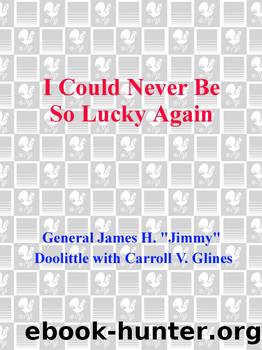I Could Never Be So Lucky Again: An Autobiography by James Doolittle & Carroll V. Glines

Author:James Doolittle & Carroll V. Glines [Doolittle, James]
Language: eng
Format: azw3
ISBN: 9780307428325
Publisher: Random House Publishing Group
Published: 2009-12-14T16:00:00+00:00
According to Potter and Braemer, however, they had not been in good friendly company when they landed. They had been discovered by a band of guerrillas, robbed, tied up, and marched off. Fortunately, they came across an English-speaking boy who led the guerrillas and their captives to his house and spread the word. Soon the guerrilla chieftain arrived and they were given back their belongings. They had then set off and were looking for Leonard when he found them.
When Paul and I arrived at the governor’s house, we were relieved to learn that four other crews had been found. As soon as I could arrange it, I sent a wire to Hap Arnold in Washington through the American embassy in Chungking: TOKYO SUCCESSFULLY BOMBED. DUE BAD WEATHER ON CHINA COAST BELIEVE ALL AIRPLANES WRECKED. FIVE CREWS FOUND SAFE IN CHINA SO FAR.
What about the other 11 crews? I soon learned through Chinese channels that some had been taken prisoner, but we didn’t know if by the Japanese or some renegade Chinese guerrilla band. Before I left the States, I had obtained $2,000 in Chinese money, which I offered as ransom. I tried to persuade a local commander to send troops out to rescue them. Their efforts were to no avail.
Our job now was to get from Tien Mu Shen, the headquarters of the local Chinese guerrillas (about 50 or more miles southwest of Hangchow) to Chuchow (Chuhsien)* the best way we could. We boarded a riverboat to transport us to a point downriver to the juncture of another river, then up the second river out of Japanese-held territory. As we moved out, we could see the searchlights of the enemy patrol boats. Fortunately, we were not intercepted. However, one incident occurred that was to have an interesting aftermath.
While we were hiding in the cabin of the boat, a Caucasian man in civilian clothes came aboard. He had been told there were Americans inside. Suspicious, he hesitated, but finally banged on the door. He called out in a strong southern drawl, “Are there any Americans in there?”
We tensed and stayed quiet. The question was repeated. The voice was convincingly American, so Paul Leonard finally said, “Hell, no Japanese can talk American like that,” and opened the door.
Outside was a tall, gaunt white man with a several-days’ growth of beard. He told us his name was John M. Birch, age 27, an American missionary based in Hangchow. After December 7, when the Japanese began to round up all Caucasians, he had fled to Shangjao, 250 miles to the southwest. He was returning on foot to Shangjao from a trip downriver when he stopped at a small Chinese inn and met a man who told him to go to the dock. There the man pointed to the riverboat and said, “Americans.”
Birch was as delighted to see us as we were to see him. He obviously knew his way around and could speak the language. I briefed him on our predicament and he agreed to join us, translate for us, and help us get on our way to Chuchow.
Download
This site does not store any files on its server. We only index and link to content provided by other sites. Please contact the content providers to delete copyright contents if any and email us, we'll remove relevant links or contents immediately.
| Afghan & Iraq Wars | American Civil War |
| American Revolution | Vietnam War |
| World War I | World War II |
Waking Up in Heaven: A True Story of Brokenness, Heaven, and Life Again by McVea Crystal & Tresniowski Alex(37003)
Empire of the Sikhs by Patwant Singh(22172)
We're Going to Need More Wine by Gabrielle Union(18072)
Hans Sturm: A Soldier's Odyssey on the Eastern Front by Gordon Williamson(16620)
Leonardo da Vinci by Walter Isaacson(11901)
The Radium Girls by Kate Moore(10907)
Educated by Tara Westover(7061)
Tools of Titans by Timothy Ferriss(6945)
How to Be a Bawse: A Guide to Conquering Life by Lilly Singh(6692)
The Last Black Unicorn by Tiffany Haddish(5075)
Permanent Record by Edward Snowden(4996)
The Rise and Fall of Senator Joe McCarthy by James Cross Giblin(4843)
Promise Me, Dad by Joe Biden(4447)
The Wind in My Hair by Masih Alinejad(4424)
The Crown by Robert Lacey(4105)
A Higher Loyalty: Truth, Lies, and Leadership by James Comey(4032)
The Iron Duke by The Iron Duke(3639)
Joan of Arc by Mary Gordon(3257)
How to be Champion: My Autobiography by Sarah Millican(3185)
